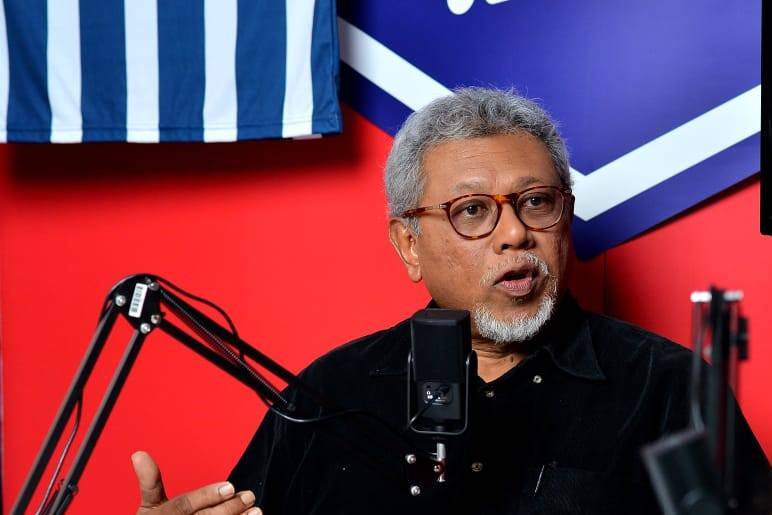Zhang Zhijie's death: 'Don't blame the officials' - Expert explains reality of medical response in badminton
Former National Sports Institute (NSI) CEO Datuk Dr Ramlan Abdul Aziz stressed that the public should realise that badminton has relatively lower injury and medical event statistics than other popular sports.

SHAH ALAM - The tragic incident of 17-year-old Chinese badminton player Zhang Zhijie's sudden death serves as a bitter lesson and an opportunity to improve medical response protocols in future competitions.
Former National Sports Institute (NSI) CEO Datuk Dr Ramlan Abdul Aziz stressed that the public should realise that badminton has relatively lower injury and medical event statistics than other popular sports.
“In my 35 years in sports, nothing dramatic usually happens in badminton. The worst incidents I have seen include a shuttlecock hitting a player in the eye, causing a detached retina.
“A female badminton player awkwardly landed in the back corner of the court, resulting in severe knee injuries - tearing the anterior cruciate (ACL), lateral collateral ligaments (LCL) and the posterior horn of the lateral meniscus all at once.
“Aside from those incidents, there have been numerous cases of ankle sprains and hamstring muscle tears or strains,” he told Sinar Daily in an interview recently.
Ramlan also noted that excluding motorsports and extreme sports where the risk of severe or life-threatening injury is inherently high and demands constant medical vigilance and rapid response, the most severe injuries in other sports typically occur in contact sports like football, rugby and hockey.
“These injuries can result from player collisions, tackles, impacts with goalposts or hits from sports implements and may include sudden death due to cardiovascular issues, head, neck and spinal injuries.
“Environmental risks such as lightning strikes and unplayable conditions can increase injury risks, necessitating close weather monitoring by medical staff to advise match officials when danger is imminent,” he added.
Ramlan also highlighted that while it may seem unusual and most shocking when it happens, it is not uncommon for healthy young athletes to experience sudden cardiac arrest, often linked to a condition known as ‘athlete's heart.’
“Post-mortem autopsy report confirmed sudden cardiac arrest in the case of the unfortunate 17-year-old young man from China competing at the recent Asian Junior Badminton Championships.
“This can happen when athletes train intensively over prolonged periods without the benefit of a pre-participation medical checkup and subsequent close monitoring of their response to training loads, including volume, intensity and integral rest periods for safe adaptation.
“Intense training causes the heart muscles, particularly the ventricles, to thicken to pump blood more effectively.
"However, this thickening can disrupt the heart's electrical conduction, leading to increased heart rates and abnormal rhythms.
“Normally, the heart pumps and relaxes in a steady rhythm, but at high heart rates, especially with an irregular rhythm, it may quiver rapidly instead of pumping effectively.
“This prevents the brain from receiving adequate blood and oxygen, resulting in a loss of consciousness,” he said.
Ramlan highlighted that when Zhang fell face-first during the game, it was evident he was already unconscious.
"The movements immediately after were seemingly involuntary muscular spasms.
“In this tragic incident during the badminton tournament, it is important not to hastily blame the umpire, medical staff or the badminton organisation without careful consideration.
“They rarely, if ever, faced such situations before. That is the reality of the game, as things stand.
"This incident highlights the current state of preparedness for handling higher levels of emergency.
“To me, even one death is one too many, especially under the global spotlight.
"It is understandable why the overall reaction was one of shock and confusion,” he said.
Ramlan also noted that when Zhang fell, his coach instinctively moved to help but hesitated upon approaching.
“The umpire, observing the coach's action, naturally exercised caution, as team officials typically do not intervene on court during play.
"The umpire is responsible for signalling medical attention, often involving brief on-court medical assessments or decisions regarding the player's ability to continue.
“It is essential to note that medical personnel at badminton events are not always positioned immediately adjacent to the courts. They may be stationed at a distance, possibly on the opposite side of the stadium, covering multiple courts simultaneously.
“Questions about the perceived delay in medical response should consider that the team was promptly alerted but had to traverse the stadium, gather necessary equipment and a stretcher, and navigate through other ongoing matches,” he noted.

Ramlan stressed that this situation should not fuel negative narratives or unfounded criticisms of the host country or the medical support team.
Instead, he said that it should serve as a poignant lesson, albeit tragically highlighted by the loss of a young, apparently healthy athlete.
“It is imperative to establish a dedicated task force to meticulously review and analyse every aspect of this incident.
"The Badminton World Federation (BWF) must already be deeply engaged in this process.
“This incident presents a pivotal moment for the BWF to reassess and potentially enhance their medical protocols. Any revisions must be rooted in comprehensive statistical data, ensuring a thorough understanding of identified gaps and the efficacy of proposed solutions.
“These updated protocols should then undergo rigorous testing and evaluation across various levels of competition globally,” he added.
Following the incident, the BWF announced a "thorough review" after Zhang collapsed during a match at the Asia Junior Championships in Yogyakarta, Indonesia.
Zhang suffered a cardiac arrest and died after being rushed to the hospital.
However, viral footage showed a "delayed" medical response, with help arriving 40 seconds after his collapse.
The BWF, in consultation with Badminton Asia and Indonesia's badminton association (PBSI), will review the incident and assess if guidelines need changes.
Malaysian badminton legend Lee Chong Wei called for better scheduling and more alert medical teams, underlining the need for immediate action following the tragedy.
Chinese state media also questioned the adequacy of the emergency response.










